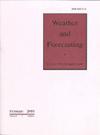国家飓风中心的风暴潮预报:用于定义风力的改进风暴大小预报的概率指导和评估案例
IF 3.1
3区 地球科学
Q2 METEOROLOGY & ATMOSPHERIC SCIENCES
引用次数: 0
摘要
美国国家飓风中心(NHC)风暴潮小组(SSU)发布风暴潮观察和预警时使用的主要指导来源是概率热带风暴潮模型(P-Surge)。P-Surge是基于NHC官方预报的历史误差分布生成的海、湖和陆地飓风(SLOSH)模型预测的集合。风暴潮预报采用概率框架,以考虑与热带气旋路径和风力有关的不确定性。以往的研究表明,风暴风场的大小是影响风暴潮的一个重要因素。基于NHC预报参数,提出了一种简单的最大风半径预报方案。验证结果表明,该方案比以前版本的P-Surge所使用的RMW预测有了改进。为了测试更新的RMW预报对P-Surge的影响,从2008-2020年有足够观测数量的25个风暴中选择了回顾性案例。使用这些改进的RMW预测对p浪涌预测的评估表明,对于大多数超出阈值的概率,检测的概率更高。此外,预测的可靠性得到了提高,并且在较长的前置时间内对极端事件的高概率预测数量有所增加。改进的RMW预报最近被纳入P-Surge (v2.9)的操作版本,并作为延长熟练和可靠的风暴潮预报的提前时间的重要一步。本文章由计算机程序翻译,如有差异,请以英文原文为准。
Operational storm surge forecasting at the National Hur ricane Center: The case for probabilistic guidance and the evaluation of improved storm size forecasts used to define the wind forcing
Abstract The primary source of guidance used by the Storm Surge Unit (SSU) at the National Hurricane Center (NHC) for issuing storm surge watches and warnings is the Probabilistic Tropical Storm Surge model (P-Surge). P-Surge is an ensemble of Sea, Lake, and Overland Surges from Hurricanes (SLOSH) model forecasts that is generated based on historical error distributions from NHC official forecasts. A probabilistic framework is used for operational storm surge forecasting to account for uncertainty related to the tropical cyclone track and wind forcing. Previous studies have shown that the size of a storm’s wind field is an important factor that can affect storm surge. A simple radius of maximum wind (RMW) prediction scheme was developed to forecast RMW based on NHC forecast parameters. Verification results indicate this scheme is an improvement over the RMW forecasts used by previous versions of P-Surge. To test the impact of the updated RMW forecasts in P-Surge, retrospective cases were selected from 25 storms from 2008-2020 that had an adequate number of observations. Evaluation of P-Surge forecasts using these improved RMW forecasts shows that the probability of detection is higher for most probability of exceedance thresholds. In addition, the forecast reliability is improved, and there is an increase in the number of high probability forecasts for extreme events at longer lead times. The improved RMW forecasts were recently incorporated into the operational version of P-Surge (v2.9), and serve as an important step toward extending the lead time of skillful and reliable storm surge forecasts.
求助全文
通过发布文献求助,成功后即可免费获取论文全文。
去求助
来源期刊

Weather and Forecasting
地学-气象与大气科学
CiteScore
5.20
自引率
17.20%
发文量
131
审稿时长
6-12 weeks
期刊介绍:
Weather and Forecasting (WAF) (ISSN: 0882-8156; eISSN: 1520-0434) publishes research that is relevant to operational forecasting. This includes papers on significant weather events, forecasting techniques, forecast verification, model parameterizations, data assimilation, model ensembles, statistical postprocessing techniques, the transfer of research results to the forecasting community, and the societal use and value of forecasts. The scope of WAF includes research relevant to forecast lead times ranging from short-term “nowcasts” through seasonal time scales out to approximately two years.
 求助内容:
求助内容: 应助结果提醒方式:
应助结果提醒方式:


